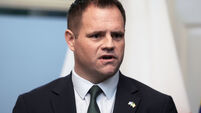Fishing speaks to the soul of Brexit mindset

Prime Minister Boris Johnson on the Opportunis IV fishing trawler, during a visit to Peterhead fish market near Aberdeen. Picture: Duncan McGlynn/PA Wire
As we continue to watch negotiators attempt to prevent Brexit talks from running aground in these final few days, the issue of fisheries has become a knotted net in the propeller.
Why is this? It all comes down to access to territorial waters and quotas for fish.















